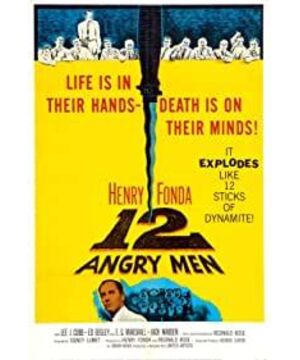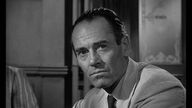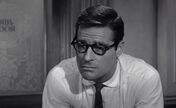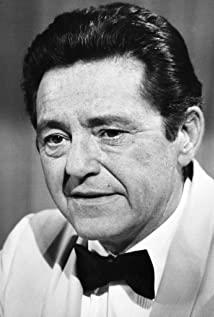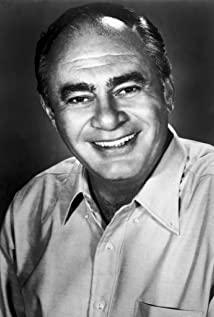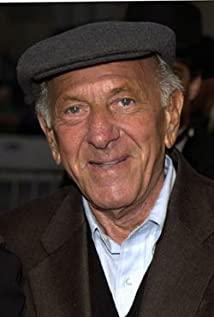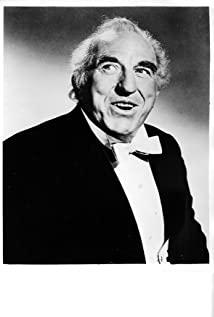Some time ago, a friend asked in the group: If multiple people participate in the decision-making, will the decision-making be more reliable? Can one person influence the decision-making of a group of people? How does it affect? Then another friend said, "Twelve Angry Men" tells this story.
Take the time to finish watching "Twelve Angry Men". I think this movie is very interesting. I haven't written a film review seriously, and I don't know how to write it. I am not going to investigate and collect relevant background information, but just talk about something from my experience of watching movies. I want to write this text in two parts: one is the plot itself, and the other is my thoughts on the institution and spirit of the film.
first part
According to my random ideas, the first part I want to start with the various turns of the situation in this story.
First, the judge's statement before the jury discussion is carried as follows. I think this is very important information and the cornerstone of the whole story:
The long and complicated trial procedure has ended. This is a first-degree murder case. Premeditated murder is the most serious crime in criminal proceedings. You have all heard the testimony and understood the legal provisions. Now you must sit down and clarify the authenticity of this case. In this case, one person has died, and the life and death of the other person is in your hands. If you can raise a reasonable suspicion, it is impossible to determine whether the defendant is guilty or not. Based on this reasonable suspicion, you must make a verdict of not guilty. However, if you cannot find a reasonable suspicion, then you must convict the defendant based on your conscience. In any case, your decision must be unanimous. If you find the defendant guilty, this court will impose severe punishment on him, and the highest penalty will be the death penalty. This is a heavy responsibility, thank you all.
This is a murder case. Twelve jurors will give their judgement on this case: an eighteen-year-old boy is accused of murdering his father. Now the jury must discuss and give a consensus: either think he is guilty or not guilty.
At the beginning of the discussion, eleven jury members thought the boy was "guilty" and only one thought it was "not guilty." (Interrupting, I think this movie shouldn't be called "Twelve Angry Men", because at most 11 "Angry men" can be counted from beginning to end...)
I think it would be boring to repeat the entire plot of the film one by one. Here I try to summarize the reasons why each juror changed his mind (in order of plot development):
No. 1 (elderly): I appreciate the questioning spirit of the oppositional attitude.
No. 2 (a man who was poor when he was young): It happened to change his mind after the despised poor man (let's call it that way), and there is reason to believe that he was stimulated.
No. 3 (man in overalls): "I don't have to defend my decision. Reasonable doubts appeared in my heart."
No. 4 (silent male): He declared his innocence in the second public voting
No. 5 (Baltimore fans): Same as above
No. 6 (hat man): "Tired of discussion"
No. 789, the third place: in the third public vote to support innocence (one of them swayed)
8, 9, 10, 11: "defeated" under the last "reasonable doubt".
From the perspective of the characters themselves and their motivations for making choices, it can be said that they are a group of people with very different living environments and value backgrounds. There are old people, young people, fathers, and grandparents. They do different professions and have different experiences. The different ideas and positions of these people are the key to this interesting discussion.
In terms of plot, I noticed three interesting places. Emotions suddenly rose or became subtle, and the relationship between the characters in the audience changed in common. As mentioned earlier, the husbands in the room are very different people, so these common changes become a very interesting window:
1. "Mr. Opposition" first counterattack
He took out a knife similar to the "killer knife" that was considered rare. At this time, everyone exclaimed. This knife proved that it is possible to "get a similar knife". This certainly does not prove that the suspect is innocent, but its "great" meaning lies in the first mention of "Nothing is that possible".
2. Gaze at "excitable man"
This gentleman was so excited in the discussion that everyone started to notice him and warned him in this way. In this movie, "excitable man" is a relatively distinctive character. He is the easiest to get excited, has the most temper and said the most cruel words. Here, he is the embodiment of irrationality in the room discussion and the representative of the "angry man". At this time, other people in the entire room warned him with their eyes, which is a way for the film to express the value tendency of the group: people may have an irrational side, but when this irrationality reaches a high level, more people in the crowd Will tend to calm down and begin to reflect.
3. Contempt for "Mr. Noble"
Like the previous point, the gentleman standing in the middle of the picture is also a relatively distinctive character. He played the role of a "Mr. Noble" in the play, as if he was a "busy man" with a successful career. He has been emphasizing the suspect's humble background, emphasizing the "inferior nature" of people, and emphasizing that he deserves the crime. However, "reasonable doubts" are rarely raised based on the merits of the case. In this scene, he couldn't stand the fact that other jurors were unable to make a guilty conviction, and he began to complain loudly in a nearly personal attack. The other eleven gentlemen left or turned their heads one by one in his complaint, and even the man in the hat who had been hanging around turned sideways. In the end, Mr. Always sitting right in front of him finally said: "Please sit down and shut your mouth!"
This scene is also a demonstration of the group consensus in the film. This gentleman's speech was resisted by everyone. Even members of the group who did not care about their jury responsibilities did not like these uncomfortable rhetoric. This shows that in the face of such serious irrational behavior, most people can still maintain a certain sense of reason.
The above are the interesting points that I noticed in the plot of the movie.
the second part
I want to start with this line. This is what a character in the movie said about their system.
Please note that we will come here, not to fight. We shoulder heavy responsibilities. I have always felt that this is the advantage of a democratic society. What shall we... say? We were notified-we received the letter, we were told to come here to decide whether a person we never knew was guilty or not. No matter what sentence is made, we will not benefit or lose. That's why our country can be so strong. We shouldn't associate this matter with our personal feelings. Thanks!
I did see the good aspects of this system in this movie. As far as this case is concerned, although we cannot conclude that the suspect did not commit a crime, we cannot be 100% sure that he must be guilty. Whether the choice made by the jury is actually correct or incorrect, we can at least say that it is logical. The eighteen-year-old boy obtained procedural justice, and even in the smallest possibility, he can still say that he is innocent. From the extension of the case to the spiritual level, the valuable spirit expressed by this film lies in: anti-preconceptions, anti-herd psychology, anti-black and white, and "reasonable doubt" (reasonable doubt). First, anti-preconceptions. To put it bluntly, this is a criminal case and one person was killed. Now there is a suspect who is closely related to him. The suspect has gone to court and has been tried. Question: Is the suspect guilty? It is easy to think that he is guilty at this time. He is the son of the deceased! He accepted the trial! There are a lot of evidence in court! In other words, the preconditions given put people in an environment related to "crimes": the deceased has a close relationship with the defendant, there are court proceedings, and there are seemingly credible evidence. It is easy to say that the defendant is "guilty" under these pre-emptive conditions. People who hold suspicion of innocence are resisting this irrationality. Second, anti-herd psychology. At the beginning of the discussion, eleven people thought they were guilty and only one said they were not guilty. This is the good atmosphere of "herd". As the old man said, the gentleman "it is not easy to fight alone against absurd remarks." Among the other eleven jurors, there is also a herd mentality (a few cannot give specific reasons, "I just feel guilty"). The whole story is actually a process in which this conformity mentality is broken. Third, it is either black or white.I think it is very important and worthy of our consideration. In fact, "black or white" thinking exists around us a lot (Weibo is full of people with this kind of brain circuit): either this or that; either right or wrong; either good or bad . I dare not say that I don't have this kind of thinking, but I must admit that this kind of thinking is often harmful. Looking at the Internet, and even the entire society, we can feel that this kind of thinking is destroying the ecology of public opinion. For example (most of the extreme left/right thinks in this way): If this system is not good, then oppose it, and the whole system must be replaced. If the system is good, then we must worship it and follow it. (Eat its fart). If xx people or xx platforms do xx things wrong, then all of their things are also wrong-xx people look good/say a right thing, then what they do/say is right. What is even more frightening is: if you disagree with my views, then you are against my views. If you point out my mistakes, then you are against me. There is no middle ground at all, and there is no room for calm thinking. I think the "innocent" consensus reached by the jury in the movie can also be viewed from another angle as an intermediate state between "guilty" and "innocence": we did not prove his innocence, we just proved that he could not Was convicted of guilt. At first everyone thought he was guilty because they couldn't see the reason for innocence: every piece of evidence seemed to point to his crime. In the hearts of most people, they are either guilty or innocent, because the environmental conditions of guilt have been preconceived. When there is no evidence of innocence, people will tend to choose "guilty" and even unwilling to even imagine innocence. Possible. The story told by the film is not necessarily a victory for judicature, but it is a victory for reason. That wise and brave gentleman is worthy of respect, precisely because he is not preconceived, not conforming to the crowd, not black and white, and finally gives A logical judgment.
Finally, I want to say a few more words about "reasonable doubt ."
When watching the movie, I have the following feeling: the confrontation between the jurors on each piece of evidence is like the picture below ( Figure 1 ). Each piece of evidence was originally used to prove the defendant’s guilt, but for each piece of evidence, it supports the innocent party. They all gave "reasonable doubts", which made them lose their full directionality and could not be used as hard evidence to confirm the crime. Each piece of evidence is related to "possibility". The only problem is that these pieces of evidence are like "canine teeth", but none of the guilty evidence can point to the point with certainty like Figure 2 . Let us go back to the beginning, " If you can raise a reasonable doubt and cannot determine whether the defendant is guilty or not, based on this reasonable doubt, you must make a verdict of not guilty. However, if you cannot find a reasonable doubt , then you The defendant must be judged guilty based on conscience." Looking at the judge's words again, we will find that the inference of the innocent party in the whole story is satisfactory, and the logic of the story can be said to be seamless.
In the end, I thought of one thing:
Reference: Script Text of "Twelve Angry Men"
View more about 12 Angry Men reviews


